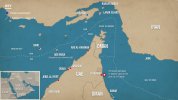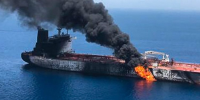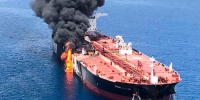duyunne
Jedi Council Member
Frontline oil tanker struck by torpedo off UAE coast: Tradewinds
OSLO (Reuters) - An oil tanker owned by Norway’s Frontline has been struck by a torpedo off the coast of Fujairah in the United Arab Emirates, shipping newspaper Tradewinds reported on Thursday, citing unnamed industry sources.
Frontline was not immediately available for comment.
The United Kingdom Maritime Trade Operations, which is part of the Royal Navy, had said on Thursday it was aware of an incident in the Gulf of Oman, near the Iranian coast.
Re:

 www.reuters.com
www.reuters.com
* * * * * * * * * * * * * * * * * * * * * * * *
Explosions on two oil tankers near Iran send oil prices 3% higher
Key Points
Re:

 www.cnbc.com
www.cnbc.com
OSLO (Reuters) - An oil tanker owned by Norway’s Frontline has been struck by a torpedo off the coast of Fujairah in the United Arab Emirates, shipping newspaper Tradewinds reported on Thursday, citing unnamed industry sources.
Frontline was not immediately available for comment.
The United Kingdom Maritime Trade Operations, which is part of the Royal Navy, had said on Thursday it was aware of an incident in the Gulf of Oman, near the Iranian coast.
Re:

Frontline oil tanker struck by torpedo off UAE coast - Tradewinds
An oil tanker owned by Norway's Frontline has been struck by a torpedo off the coast of Fujairah in the United Arab Emirates, shipping newspaper Tradewinds reported on Thursday, citing unnamed industry sources.
* * * * * * * * * * * * * * * * * * * * * * * *
Explosions on two oil tankers near Iran send oil prices 3% higher
Key Points
- Attacks on tanker ships near the world’s busiest sea lane for oil shipments send oil prices sharply higher, partially reversing a deep slump in crude futures.
- Tankers the Front Altair and the Kokuka Courageous have sustained significant fire damage in the Gulf of Oman, and their crews have been evacuated.
- The strikes come against a backdrop of heightened tension between the U.S. and Iran and follow last month’s attacks on four tanker ships in the Middle East.
Re:

Explosions on two oil tankers near Iran send oil prices 2% higher
Attacks near the world's busiest sea lane for oil shipments come amid escalating tensions between Iran and the United States and its allies in the Gulf.










